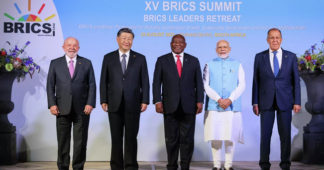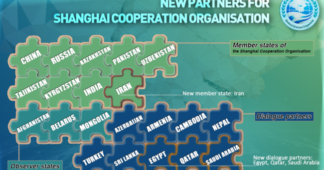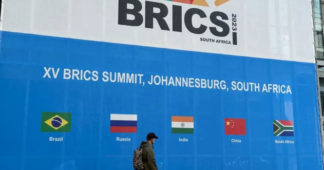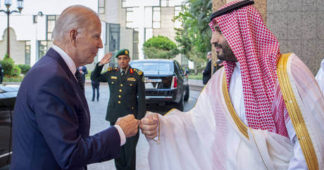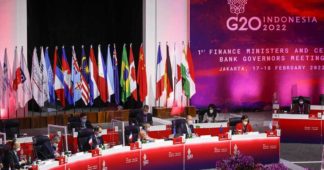By Panagiota Paparouna*
“Whoever rules the Eastern Europe will rule the Heartland, whoever rules the Heartland will rule the World Island, and whoever rules the World Island will rule the world”! This thesis became well known, as the Heartland Theory of Halford John Mackinder in 1904. That is exactly the western strategic doctrine since then with the improvement of Rimland Theory by Nickolas Spykman after the Second World War to avoid Eurasian powers come together under Brzezinski’s modern geostrategic blueprint.
That is why the gathering of fourteen Eurasian leaders round the same SCO’s table as partners with one status or another in a flamboyant Samarkand Summit in August of 2022 is very important matter especially for the West. Furthermore, except UN, five regional organizations also had represented. ASEAN, CIS, CSTO, EAEU and CICA most of which are taking part in negotiations for the Greater Eurasian Partnership. All of these structures along with the giant trans-border economic initiative of OBOR, projects and organizations are been treated as nodes and individual parts of the future single Eurasian economic mechanism rather than potential regional competitors. According to its originators, the objective of the Partnership is to assemble these parts and nodes together without detriment to those elements that have already demonstrated their efficiency.
This particular SCO’s summit attracted unusual publicity than ever before globally in mass media. Not only because they were no western leaders as always but most of all because the Arabic countries of Gulf applied to join the SCO and they have been accepted as Dialogue Partners. They got the status to take part in the next (virtual) Summit was held in New Delhi under India’s presidency in July 2023 which has the presidency of G-20 as well. The title of SCO summit under India’s chairmanship was “Towards a SECURE SCO” the acronyms of Security; Economy and Trade; Connectivity; Unity; Respect for Sovereignty and Territorial Integrity; and Environment. These particular themes had highlighted during the Summit.
But the most important Eurasian integrated news this year came from Johannesburg where the BRICS[1], a brother mechanism which derives its power from SCO and its “Shanghai Spirit”. BRICS decided to its great enlargement since 2010[2] with six new countries from many continents. Argentina, Egypt, Ethiopia, Iran, Saudi Arabia and the United Arab Emirates invited to become full members of BRICS from the first day of the 2024. Days before the BRICS Summit, China and India made publicly their compromise agreement that they wished to resolve their cross-border disputes peacefully.
In this case, the Heartland approaches Rimland rapidly while an important indicator of SCO and BRICS success story is the number of application of countries that want to join them. Naturally, BRICS group attracts the global publicity but the real center is the SCO, which nobody wants to know in the West. The vital SCO area is the Central Asia but one of the most important chock point of the world is the South China Sea who all want it at any cost. Why? Because it is a common geopolitical secret based on the South China Sea that about 1/3 of the world’s shipping passes through its waters, while it is believed that huge amounts of oil and natural gas lie beneath its bottom but the most of all is that passes 99% of global internet. With the words of Haley Zaremba, “The crux of the war is underwater cables. More than 99% of all international internet traffic is carried through such subsea cables, which are overwhelmingly controlled by a handful of Big Tech companies in the U.S., “namely Google-owner Alphabet, Facebook-owner Meta, Amazon and Microsoft.” As the internet economy ramps up in Asia – it has expected to reach $1 trillion in value by just 2030 – other economic powers now want their slice of that pie. Whoever controls the cables that cross through the South China Sea will stake a major claim to that $1 Trillion”.[3] In that case, in Eurasian area stand, the most powerful western hi-tech enterprises ever. If this is true then whoever controls the internet cables rules the globalization and the whole world too. On the other hand, at the junction of the East and South China Sea stands the Taiwan Island which China waiting the right opportunity to get it back in its territory while USA promised to protect it’s sovereignty. Probably in response to rising threats from China over Taiwan, the US Navy is reviving a top-secret undersea surveillance network dating back to the’50s, according to Reuters.[4]
Actually, the spectacular SCO Summit of Samarkand turned the spotlight of international public opinion and especially of the West towards Eurasia, bringing back the Mackinder prophecy as a nightmare In stark contrast, SCO’s and BRICS’s remarkable expansion plays a significant role in global scene recently. These integrated approaches underscores Eurasian commitment to transform the current world order into a new one and the collective west cannot turn a blind eye anymore while at present the world is facing a sluggish economic recovery after pandemic crisis during the war in Ukraine.
In relatively short period, the SCO has come a long way, becoming an integral element of the modern global and economic world order. According to Samarkand Declaration the ongoing effort to strengthen interconnectedness between Central and South Asia contribute to achieving the common goal of ensuring prosperity and security in the vast SCO region through the formation of sustainable trade, economic, transport and communication ties and strengthening inter-civilization dialogue”.
Andrey Kortunov wonders if Heartland Reunion is a geopolitical chimera or a historical chance. That is the question. It depends not only on internal and external factors of Eurasian area but also on economic globalization process. Because there is no a geopolitical matter for states not even a super power state to rule the world alone regardless the other political or economic or even digital players on “Grand Chessboard” we are all connected with the same cable of life, all over the world.
[1] Brazil, Russia, India, China, South Africa
[2] South Africa got the status of full member adds ‘s acronym at the end of its name of the BRIC’S’
[3] Haley Zaremba, “A Secret War is Brewing in the South China Sea”, May,04, 2023, oil.com https://oilprice.com/Energy/Energy-General/A-Secret-War-Is-Brewing-In-The-South-China-Sea.html
[4] Joe Brock, “US revives Cold War submarine spy program to counter China”, Sept 21, 2023 Reuters, U.S. revives Cold War submarine spy program to counter China
* Master in European and International Relations, University of Athens (EKPA).
We remind our readers that publication of articles on our site does not mean that we agree with what is written. Our policy is to publish anything which we consider of interest, so as to assist our readers in forming their opinions. Sometimes we even publish articles with which we totally disagree, since we believe it is important for our readers to be informed on as wide a spectrum of views as possible.
